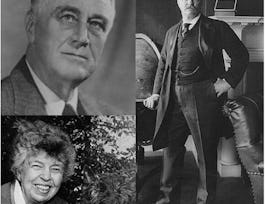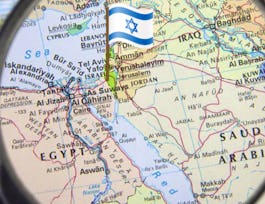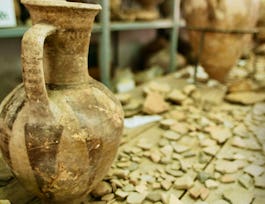This course will review the emergence of the modern Middle East from the fall of the Ottoman Empire, at the end of the First World War to the present. We will discuss the Ottoman legacy in the region and the Western imperial impact on the creation of the Arab state system. The course will review the rise and retreat of Arab nationalism, the problems of internal cohesion of the Arab states, issues of religion and state, and the evolution of Islamist politics. We will also focus on the evolution of the Arab-Israeli conflict and its impact on the region and will conclude with an in depth analysis of the “Arab Spring” by placing these contemporary revolutionary events in their historical context.


The Emergence of the Modern Middle East - Part I
Taught in English
Some content may not be translated
48,156 already enrolled
(1,121 reviews)
Details to know

Add to your LinkedIn profile
2 quizzes
See how employees at top companies are mastering in-demand skills


Earn a career certificate
Add this credential to your LinkedIn profile, resume, or CV
Share it on social media and in your performance review

There are 4 modules in this course
In our first lesson, we will locate the Middle East in time and space. We will get to know the 19th-century Middle East, the structure of its society and economy as well as the dynamics of its politics. We will then look into the dramatic change that took place in the last quarter of the 18th century, that is the widening gap between Europe and the Middle East as we will dwell on the impact this change had on the future of the region. We will conclude our first lesson with a discussion on the "Eastern Question," which refers to the fate of the Ottoman Empire and the balance of power in Europe.
What's included
9 videos2 readings1 plugin
Our second lesson is a discussion on the forces of modernity and tradition in the Middle East. The filtering of European ideas into the Middle East engendered a process of reform in the region throughout much of the 19th century. We will analyse two centres of reform in this respect, namely the Ottoman Empire and Egypt. This analysis will take us next to the Islamic responses to the crisis of modernity as a result of the inherent tension between faith and secularism. We will see how various Islamic thinkers tried to find a compromise between these obvious tensions and at times went in more fundamentalist directions.
What's included
11 videos1 reading1 quiz
In lesson three, we will witness the rise of nationalism in the Middle East, as it became a much more acceptable idea in the late 19th and early 20th century among an intellectual, elitist, urban minority, who were the graduates of western-style schools (remember lesson two and the process of reform!). We will concentrate on the emergence and development of three nationalist movements; Turkish, Egyptian and Arab. Lastly, we will speak about the First World War and how it brought the end of the Ottoman Empire as well as the end of 400 years of Ottoman Turkish rule in the Arab countries. We will also see how the Middle East began to take its current shape following the First World War.
What's included
9 videos1 reading
In our fourth lesson, we will be speaking about the creation of the Middle East state system in accordance with British and French designs after the First World War. First, we will discuss Egypt and how its distinct historical development gave way to a unique liberal experiment in Egypt during the 1920s and 1930s and consequently to a steady shift toward Islam and Arab nationalism. Second, we will discuss the area of the Fertile Crescent in comparison to Egypt and the creation of British (Palestine, Trans-Jordan, Iraq) and French mandates (Syria, Greater Lebanon) in this region. Our attention will then shift to the non-Arab states. We will learn about the creation of the Republic of Turkey on the ruins of the Ottoman Empire and the sweeping process of modernising reform under Mustafa Kemal. Lastly, we will take a look at Iran, which was, like Turkey, not a new state created by the Great Powers but a country with a long history and cultural tradition. Our discussion on Iran will include an overview of its history from early 16th century onwards as well as the basic principles of the Shi'a which shaped greatly the political culture in Iran.
What's included
15 videos2 readings1 quiz1 plugin
Instructor

Offered by
Recommended if you're interested in History

Tel Aviv University

Universiteit Leiden

Tel Aviv University

Tel Aviv University
Why people choose Coursera for their career




Learner reviews
Showing 3 of 1121
1,121 reviews
- 5 stars
78.80%
- 4 stars
17.89%
- 3 stars
2.67%
- 2 stars
0.17%
- 1 star
0.44%

Open new doors with Coursera Plus
Unlimited access to 7,000+ world-class courses, hands-on projects, and job-ready certificate programs - all included in your subscription
Advance your career with an online degree
Earn a degree from world-class universities - 100% online
Join over 3,400 global companies that choose Coursera for Business
Upskill your employees to excel in the digital economy
Frequently asked questions
Access to lectures and assignments depends on your type of enrollment. If you take a course in audit mode, you will be able to see most course materials for free. To access graded assignments and to earn a Certificate, you will need to purchase the Certificate experience, during or after your audit. If you don't see the audit option:
The course may not offer an audit option. You can try a Free Trial instead, or apply for Financial Aid.
The course may offer 'Full Course, No Certificate' instead. This option lets you see all course materials, submit required assessments, and get a final grade. This also means that you will not be able to purchase a Certificate experience.
When you purchase a Certificate you get access to all course materials, including graded assignments. Upon completing the course, your electronic Certificate will be added to your Accomplishments page - from there, you can print your Certificate or add it to your LinkedIn profile. If you only want to read and view the course content, you can audit the course for free.
You will be eligible for a full refund until two weeks after your payment date, or (for courses that have just launched) until two weeks after the first session of the course begins, whichever is later. You cannot receive a refund once you’ve earned a Course Certificate, even if you complete the course within the two-week refund period. See our full refund policy.


